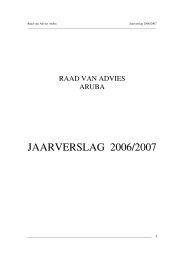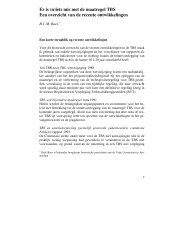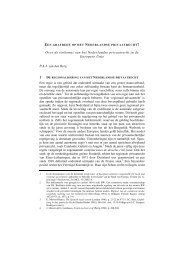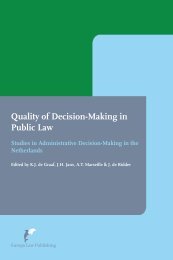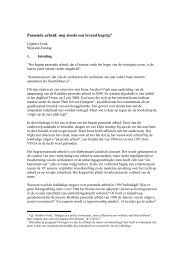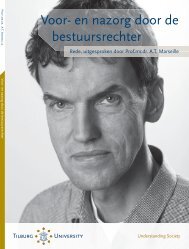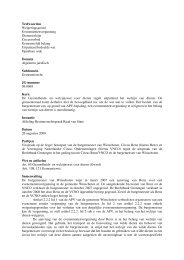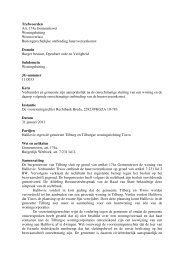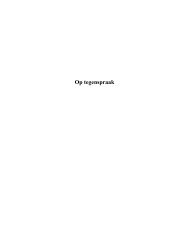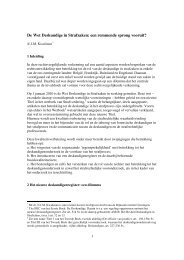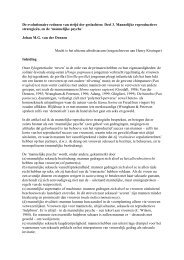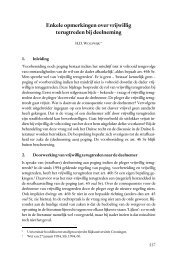Evaluatie embryowet - Rijksuniversiteit Groningen
Evaluatie embryowet - Rijksuniversiteit Groningen
Evaluatie embryowet - Rijksuniversiteit Groningen
You also want an ePaper? Increase the reach of your titles
YUMPU automatically turns print PDFs into web optimized ePapers that Google loves.
ing complete and absolute compliance with the regulations concerning the provision of gametes and<br />
embryos.<br />
If, in order to obtain gametes, it is necessary for the person concerned to undergo an invasive intervention,<br />
the Act requires the approval of the MEC (among other things). Parliament’s intention with<br />
this extra safeguard, which is aimed at promoting the donor’s freedom to decide, was to look especially<br />
carefully at proportionality, and to assess the donor’s motives whenever an invasive intervention<br />
is performed for a purpose other than establishing a pregnancy in the donor. This will, if anything,<br />
become even more important in the future if women are able to donate eggs in order to create<br />
embryos for scientific research. Should this result in a shortage of eggs, women’s freedom to decide<br />
may come under pressure.<br />
The study findings indicate that this consent procedure raises various problems and that, in practice,<br />
people opt for alternative interpretations as far as egg donation is concerned. The conclusion drawn is<br />
that Parliament’s aim (i.e. extra protection) merits support, but that the statutory review procedure is<br />
not conducive to the achievement of this objective. It would be advisable to remove the role of the<br />
MEC from the Act and to arrive at an arrangement which ensures that donors as a rule receive support<br />
when they are weighing up all of the interests at stake and making an informed decision about<br />
donation. That support should be given by an independent, expert counsellor who is not involved in<br />
the donation. This recommendation can be elaborated via self-regulation.<br />
The findings indicate that questions arise in the course of scientific research with regard to the scope<br />
of the donor’s consent in connection with the provision of embryos for scientific research. The question<br />
to be answered is how specific this information – and therefore the consent – must be. In particular,<br />
this problem arises in connection with the scientific use of stem cells harvested from surplus<br />
embryos, which have a very long shelf-life. It is unclear whether these may later be used for new research<br />
projects on the basis of the consent that was given previously. Nor is it clear whether, once<br />
consent has been given, it covers the transportation of embryos or stem cells abroad, or whether the<br />
donors need to have been informed about this in advance.<br />
These questions concerning informed consent also arise in connection with use (or further use) of<br />
other human tissues. Parliament should be well advised to formulate general rules concerning the<br />
specificity of the consent that is given in connection with the provision of human tissues for scientific<br />
use, and then to consider whether these general rules may also apply to embryos.<br />
Scientific research with foetuses<br />
The Act only allows scientific research with foetuses that may assist in the diagnosis, prevention or<br />
treatment of serious disorders in a foetus and that cannot be deferred until after the birth. The evaluation<br />
study indicates that these strict conditions have the effect of limiting therapeutic scientific research<br />
with foetuses, even if the risk to the foetus is negligible or non-existent, while non-therapeutic<br />
research with foetuses is rendered quite impossible. It also indicates that the limits of the Medical Research<br />
Involving Human Subjects Act (WMO), which is applicable to scientific research involving<br />
pregnant women, are unclear.<br />
We believe that Parliament should reconsider the rules concerning scientific research with foetuses.<br />
One possibility might be to broaden the conditions so that they are more akin to the provisions for<br />
20




